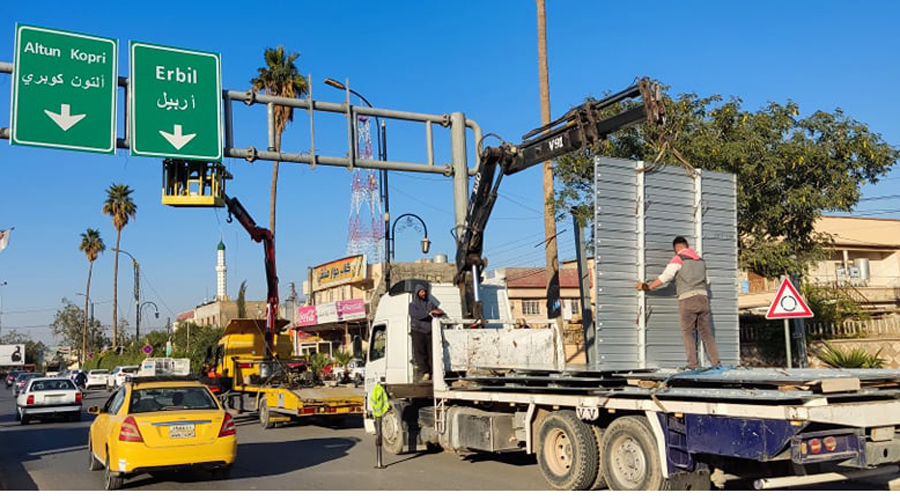The public signs will be installed in Kirkuk next week, this time in all four native languages: Arabic, Kurdish, Turkmen and Syriac, following last December debate over signs written in Arabic and English only.
"From next week, we will replace all the signs that were removed in January this year due to the lack of Kurdish language in the streets," Faraidoun Adel, director of the Kirkuk municipality, told KirkukNow.
"This time the Kurdish language has been added and written in four languages of the people of the province," Adel said.
"All the address signs should have been hung in Kirkuk several months ago, but the work was stopped due to the lack of Kurdish language on the signs," he added.
In early December, a number of address signs were installed on a street in Kirkuk, but only in Arabic and English and not in Kurdish and other local languages of the province, which caused discontent of the locals in social media platforms and were removed.
Then Adel affirmed in a TV interview that the task of preparing, writing and hanging the signs was with the duty of traffic engineering department of the municipality.
"If the signs are written in one or two languages, the drivers will be able to read it easily because the writing will be larger, but we do not accept that.”
The Kirkuk administration issued a statement calling on everyone to follow the use of Arabic, Kurdish, Turkmen and Syriac languages on all signs in offices, roads, bridges and administrative units of Kirkuk province.
"Anyone who acts contrary to these recommendations and guidelines, whether on office signs or road and traffic signs, will be considered a vandalism.”
The project to replace and renew the signs dates back to 2019, but has been implemented this year. Before the change, the signs were written in Arabic, Kurdish and English.
The issue of signs in the local languages of the province is important to citizens, especially those who speak only their mother tongue.
Musa Fuad, a Kurdish shopkeeper in Kirkuk, says he attended primary, secondary and high school in Kurdish and does not understand Arabic.
Kirkuk, Iraq’s second largest oil reserves, is an ethnically mixed province for 1,7 million Kurds, Arabs, and Turkmens. Located 238 kilometers north of Baghdad, it has long been at the center of disputes between Baghdad and the Erbil.
Kurds were holding the senior position in Kirkuk including governor of Kirkuk up to October 2017 when the Iraqi troops ousted the Kurdish forces following declaration of victory over the Islamic State in Iraq and Levant ISIL.
Back in 2018, the Turkmens and Arabs each have got each three seats of the 12 parliamentary seats of Kirkuk and the rest six has gone to the PUK, one of the key Kurdish parties and stakeholder of the Iraqi Kurdistan Regional Government KRG along with its decades’ ally-competitor Kurdistan Democratic Party KDP which boycotted elections in Kirkuk.
In October 10th general elections, Turkmen candidates have won two seats while the Arabs have got four seats. PUK has lost half of its seats, 2 to KDP and one for the New Generation.
Currently, the Iraqi army, local and federal police, Brigade 61 of Special Forces along with Shiite paramilitary of Popular Mobilization Forces PMF, are under Kirkuk joint operations’ command, an umbrella for the security forces running the security of Kirkuk province.





